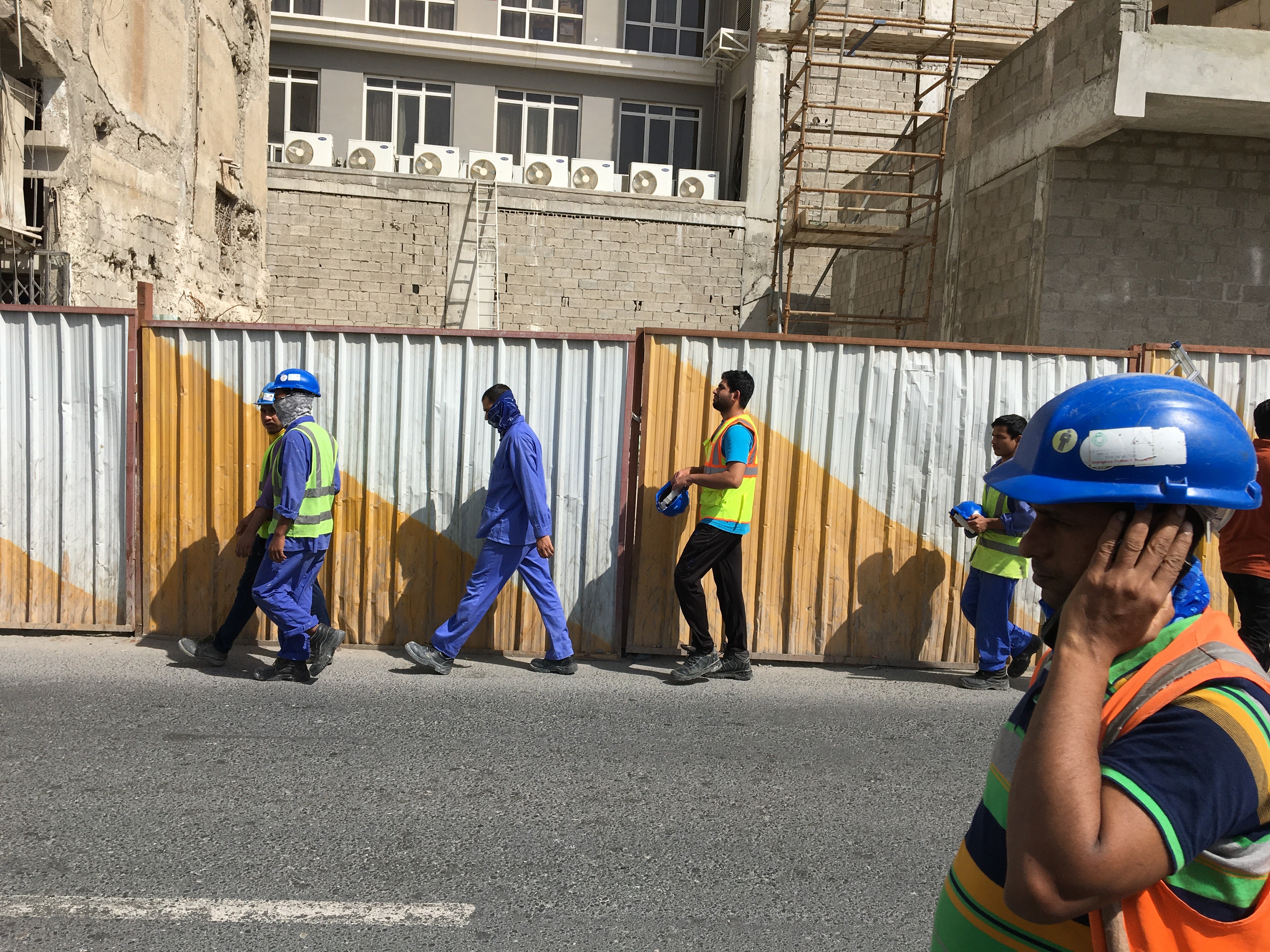Where is Malcolm? Qatar urged to release worker activist held for breaching ‘security laws’
Malcolm Bidali, a Kenyan who wrote first hand about migrant workers in Qatar, is being held by security services

A coalition of organisations working on the rights of migrants in Qatar have called on the Gulf state to urgently reveal the whereabouts of a Kenyan security guard, taken from his labour accommodation earlier this month.
Malcolm Bidali, 28, has provided rare first-person accounts detailing the conditions faced by the vast numbers of migrant workers in Qatar, the host country of the 2022 World Cup.
Writing under his pen name Noah for the advocacy group Migrant-Rights.org, Bidali has written about everyday abuses faced by workers in Qatar, including packed accommodation, the confiscation of passports and low wages.
His testimony drew “a lot of attention from different groups in the country and outside”, the organisation’s Associate Editor and Director of Projects, Vani Saraswathi, toldThe Independent.
But Mr Bidali went a step further and actively engaged in advocacy efforts. In the days leading up to his arrest, he gave a presentation to a large group of civil society organisations and trade unions. He also shared a tweet about the strike of security guards employed by one of Qatar’s leading security groups that supply workers to the Ministry of Labour.
Those tweets were picked up by international media organisations at a time when there are growing calls in some countries for a boycott of the 2022 World Cup because of the conditions faced by workers such as Mr Bidali.
“This was his life; he was breathing this thing, hoping to make a difference,” said Saraswathi.
In his last piece - ‘Minimum wage, maximum adjustment’ - Mr Bidali highlighted his colleagues’ view on what the International Labour Organisation (ILO) celebrated as a “historic move”: the Gulf’s first non-discriminatory minimum wage.
The monthly wage of 1,000 Qatari riyals, confirmed earlier this year, around £195, is described as “peanuts”.
It is not exactly clear why Mr Bidali has been detained but a government spokesman said he had been placed under investigation for violating Qatar’s “security laws and regulations”.
“All procedures of the investigation are being carried out in accordance with Qatari law,” a government official told The Independent, noting Bidali “retains all his rights”.
As of yet, he has not been charged with any offence. Nor is it known where he is being held.
Mr Bidali is in his second stint working in Qatar. He initially arrived in 2016 and decided to fly back home to start a greenhouse farming business. After his dream of being self-employed was “shot down by one man’s greed”, he was left with little option to return to the Gulf.
Things went sour after he was recruited in September 2018 to work 12 hours a day, 26 days a month, for the Qatar-based manpower supplier GSS Certis International (GSSCI).
“If I had to describe life here in one word, it would be: bleak,” he wrote in May 2020.
In his blog posts he described, first-hand, the plight of workers in the country who make up the vast majority of Qatar’s 2.8 million population.
A low-income African worker speaking up has probably been seen as “someone punching above his weight”, Saraswathi said.
The Kenyan Embassy in Doha did not immediately respond to a request for comment. Some 50,000 Kenyans work in Qatar.
The World Cup host has bowed to international pressure in recent years and introduced some labour reforms, including the minimum wage. It has also largely dismantled its ‘kafala’ labour system, which did not allow workers to change jobs or even leave the country without the permission of their boss.
Critics however point to the fact there has been domestic pushback against working practices and that the government is not enforcing the reforms strongly enough.
Ms Saraswathi said Mr Bidali had become “a bit concerned” about possible reprisals, particularly from his employer, as he was speaking up against their treatment of migrant workers.
“But I don’t think - I maybe wrong - that he expected to be seen as a threat to state security.”
The arrest of Mr Bidali is a brutal reminder that migrant workers who make public their grievances by communicating with journalists and human right activists are at risk.
“Workers who speak up as an individual still have to fear retaliation from their employer or less advanced institutions. That is why we are there and hoping for the day that workers can rely on the collective power of unions”, said Eddy Stam from UNI Global Union, a Switzerland-based global trade union active in Qatar to raise worker’s voices.
Trade Unions are not allowed in Qatar. But there have been sporadic challenges by workers against their employers. Two years ago, thousands of construction workers demonstrated over wages not being paid.

Since it opened an office in Qatar, the ILO has worked with Qatari authorities to establish retaliation channels through which workers can report grievances against employers, a process Mr Stam calls an “essential in-between stage.
The 2021 World Press Freedom Index ranked Qatar 128 out of 180 countries, noting local journalists are “left little leeway by the oppressive legislative arsenal”.
Qatar’s Emir amended the country’s penal code in early 2020 to authorise the imprisonment of anyone who publishes or share “false news” with the intent to “harm national interests, stir up public opinion, or infringe on the social system or the public system”. This is contrary to the International Covenant on Civil and Political Rights that Qatar ratified in 2018.
The country’s draconian censorship system largely discourages local news outlets from reporting on sensitive topics, including migrant workers abuses ahead of the 2022 World Cup, although there have been more reports locally on the subject in recent months.
The arrest of Bidali is to “instil fear in him and in others who would want to speak up,” Ms Saraswathi said.
According to sources, the security guard’s colleagues are “terrified”.
Join our commenting forum
Join thought-provoking conversations, follow other Independent readers and see their replies
Comments
Bookmark popover
Removed from bookmarks